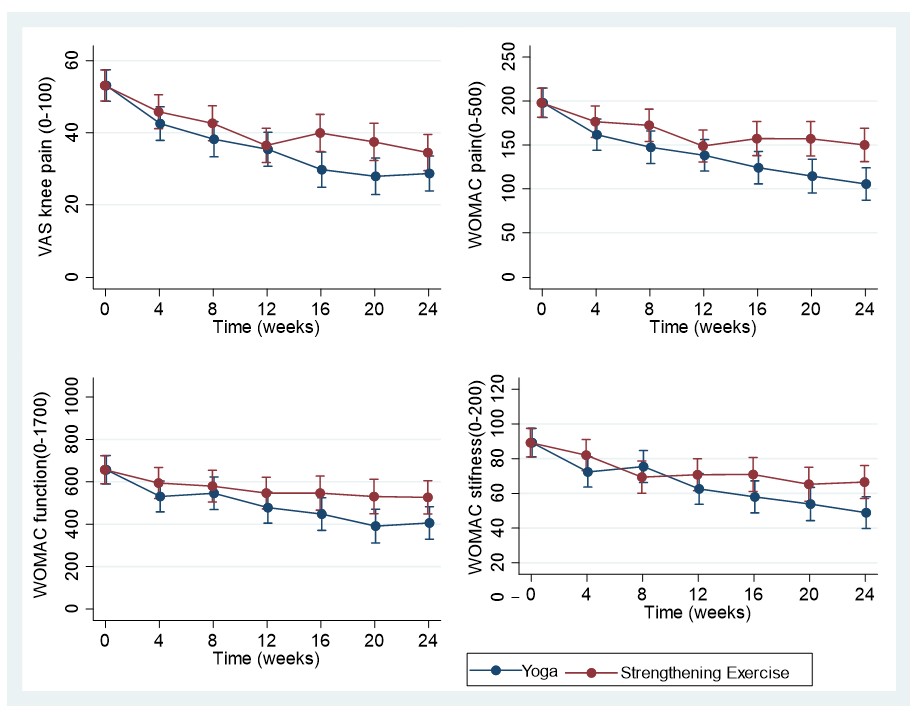Session Information
Session Type: Abstract Session
Session Time: 4:00PM-5:30PM
Background/Purpose: There is uncertainty about the best type of exercise to optimise outcomes for people with knee osteoarthritis (OA). Strengthening exercise is commonly recommended. However, yoga may have greater effects than strengthening given its focus on the mind and body with purposed benefits on flexibility, muscle strength, balance, fitness, while addressing the psychosocial sequelae. This study compared the effectiveness of a 24-week yoga program to strengthening exercise for knee OA.
Methods: The YOGA trial is an assessor-blinded (for non-patient-reported outcomes) randomised, active controlled superiority trial that included pre-specified non-inferiority outcomes. We recruited eligible symptomatic knee OA participants aged ≥40 years who fulfilled ACR clinical criteria with knee pain ≥40mm on 100mm visual analog scale (VAS). Participants were randomly assigned to a 24-week yoga program or strengthening exercise program (two supervised sessions and one home-based session per week for 12 weeks + three home-based sessions per week from 13-24 weeks). The primary outcome was change in knee pain over 12 weeks, assessed on a 100mm VAS. Secondary outcomes included, WOMAC scores, patient global assessment, physical performance measures, quality of life, depression, and neuropathic pain over 12 and 24 weeks.
Results: We screened 213 participants for eligibility between June 2021 and June 2022 and randomly assigned 117 participants to a yoga program (n=58) or a strengthening exercise program (n=59). Baseline characteristics of the participants between the groups were similar, with a mean (SD) age of 62.5(8.3) years, and 72.6% were female. Over 12 weeks, VAS knee pain score did not differ significantly between yoga and strengthening exercise groups with a between-group difference of -1.1mm [95%CI:-7.8,5.7]. Similarly, the VAS knee pain over 24 weeks was not significantly different (-5.8 mm [95%CI:-12.8,1.2]). The yoga group showed significantly greater improvements than the strengthening exercise group over 24 weeks (between-group difference) for WOMAC pain (-44.5mm [95%CI:-70.7,-18.3]), WOMAC function (-139mm [95%CI:-228.3,–49.7]), WOMAC stiffness (-17.6mm [95%CI:-30.9,-4.3]) and patient global assessment (-7.6mm [95%CI:-15.1,-0.2]). Additionally, yoga group had a significantly greater improvement than the strengthening exercise in depression (-1.1 [95%CI:-1.9,-0.2]) over 12 weeks and quality of life (0.04 unit [95%CI:0.0,0.07]) over 24 weeks. No serious adverse events were reported. There were 31 non-serious adverse events in 22(39%) participants in the yoga group and 23 in 16 (28%) participants in the strengthening exercise group over 24 weeks, mostly not related to the interventions.
Conclusion: A 24-week yoga program did not significantly reduce knee pain more than a strengthening exercise program over 12 weeks in participants with knee OA. However, the yoga program was non-inferior to strengthening exercise, as per the pre-determined non-inferiority margin. Secondary outcomes indicated that the yoga program resulted in modestly greater improvements in knee symptoms, depression, and quality of life over 24 weeks compared to strengthening exercise.
To cite this abstract in AMA style:
Abafita B, Singh A, Aitken D, Moonaz S, Palmer A, Blizzard L, Ding C, Drummen S, Jones G, Bennell K, Antony B. Comparative Effectiveness of Yoga and Strengthening Exercise for Treating Knee OsteoArthritis: A Randomised Controlled Trial (YOGA Trial) [abstract]. Arthritis Rheumatol. 2023; 75 (suppl 9). https://acrabstracts.org/abstract/comparative-effectiveness-of-yoga-and-strengthening-exercise-for-treating-knee-osteoarthritis-a-randomised-controlled-trial-yoga-trial/. Accessed .« Back to ACR Convergence 2023
ACR Meeting Abstracts - https://acrabstracts.org/abstract/comparative-effectiveness-of-yoga-and-strengthening-exercise-for-treating-knee-osteoarthritis-a-randomised-controlled-trial-yoga-trial/

